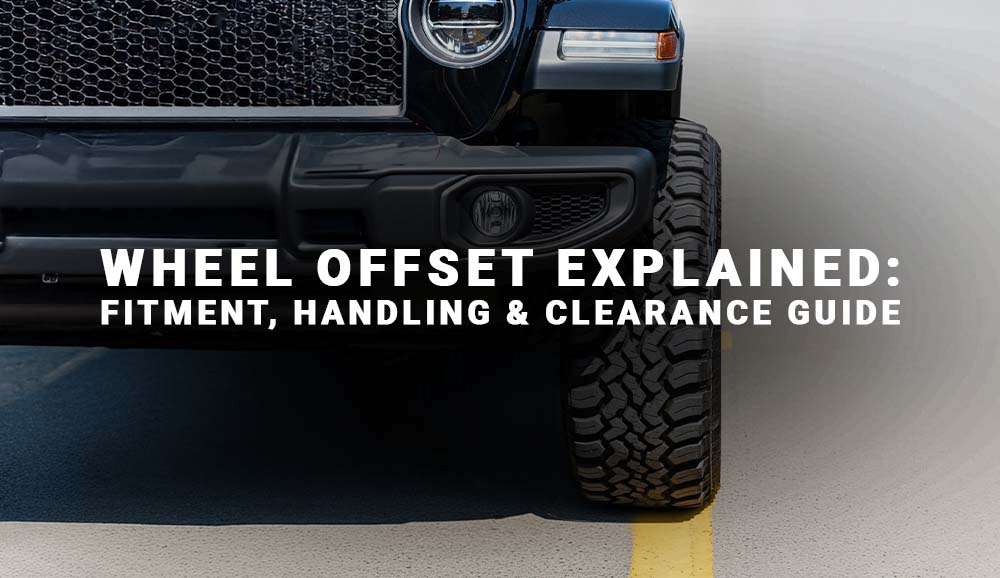Shipping is free for all orders | 90 Days money back guarantee
Shipping is free for all orders
Different Types of Tire Warranties Explained
Agota Szabo - January 26, 2023
Table of Contents:
The world of tire mileage warranties can easily become complicated. Often, they are not clear cut, and vehicle owners can get confused with the varying information provided to them.
But, the most important one might be: how do tire mileage warranties work?
Let us walk you through what these warranty types are, what is the warranty period, and how can you prolong the life of your tires!
Table of Contents
How Do Tire Warranties Work?
In an ideal world, tires would last a lifetime. Sadly, tire failures are still part of our lives.
A tire manufacturer's warranty helps to minimize the cost for drivers to lose their tires prematurely. A warranty claim can be filed for different reasons, but the basic wheel and tire warranty covers only mileage and manufacturing failures.
When Do Tire Warranties Expire?
Every tire warranty has a specific time limit on them. However, that length depends on the tire manufacturer. Generally speaking, the limited warranty offered with new tires is specified in months or years, starting from the purchase.
The "time limit" of the warranties starts from the tire's date of purchase. For this reason, in order to file a warranty claim, proof of the date of purchase (new tire receipt) is required. Often, if such proof is not shown, tire manufacturers will take the tire's week of manufacturing (part of the DOT code) as the starting point.
Additionally, tire warranties expire as soon as the tread life reaches 2/32" remaining tread, or the treadwear indicator parts. At this time, the tire does not have enough tread life left to provide adequate traction.

How to Get Tires Replaced Under Warranty?
In order to resolve a claim without any warranty issues, all proper documentation that is required needs to be provided.
Even if the tread life wears away sooner than promised, tires with improper maintenance will be rejected. For a warranty claim to be accepted, drivers must provide service records detailing how often the tires were rotated. This, along with the date of purchase documentation shows tire manufacturers the tires were taken good care of.
Does Tire Warranty Cover Nails?
Sadly, most tire warranty on new cars or old ones do not cover nails and other damage caused by a road hazard.
Yet, drivers can purchase additional tire road hazard insurance. This type of tire protection covers damage caused to the tire during routine drives. Nails, glass, potholes, etc. damage is included under road hazard coverage.
What Do Tire Warranties Cover?
As mentioned before, different manufacturer warranty covers various parts of the tires. Tire warranties are not equal and not all tire brands offer all of them.
So, what does tire warranty cover?
Let's take a look and break down the most important aspects of each tire warranty model.
Tread Wear Warranty (Mileage Warranty) Explained
The most widely known of the manufacturers' warranty models is the treadwear or mileage warranty. They are a popular method for ranking different tires available on the market.
A mileage warranty on tires states the estimated tread life in miles for each tire model. Manufacturers also set a time limit for this type of warranty. Depending on the tire brand, it is valid usually for four, five, or six years starting from the day of purchase.
However, if the tread depth reaches 2/32" (the treadwear bars) before this time expires, drivers can request compensation. Manufacturers can provide a partial refund for the tires, which is determined based on the difference between what the mileage warranty covers and the actual mileage driven.
In order to qualify for tread life warranties, drives must make sure the tread wears evenly across the entire footprint. A noticeable heat ring on tire will exclude tires from the warranty. Proof of service for rotations also needs to be provided when filing a warranty claim.
Workmanship and Materials Tire Warranty
Workmanship and materials warranties protect the driver from extra costs in case the tire fails due to manufacturing issues. When the problem arises from the raw materials or quality of workmanship, it is covered under this warranty.
This warranty is usually valid for the first year of ownership or the first 25% of the tread depth's wear, whichever comes first. In such instances, manufacturers will exchange the damaged tire for a new one. However, tax and shipping fees are not covered.
Additionally, tires must have an unusual issue with them to be covered under this warranty. It needs to be proven that tire failure did not occur due to the vehicle's mechanical issues or improper tire maintenance.
Tire Uniformity Warranty
The tire uniform warranty is for a new tire that has an imbalance in its weight. Therefore, these tires cannot be properly balanced, which results in vibrations and disturbances in the vehicle's cabin.
Such a warranty is only valid for a short time, as manufacturers deem such new tire defects easily noticeable. If the tires are responsible for the vehicle's reduced driving comfort, it will be apparent immediately. For this reason, a claim should be filed within the first 1-2/32" of tread wear or the first year of use.
Due to the strict inspection process, manufacturers will not accept that all four tires have balancing issues. Out-of-round tires should be isolated and the claim should only be filed for the problematic ones. Claims for all four tires will be rejected.
Then, What Is a Road Hazard Warranty?
Limited road hazard warranty on tires basically offers road hazard protection. In other words, damage caused by nails, glass, debris, and potholes is under road hazard coverage.
Unfortunately, these issues are outside of the control of the tire manufacturers, as the tires do not fail due to their neglect. As a result, road hazards are not covered under a regular tire manufacturer warranty.
Still, some manufacturers offer a limited road hazard tire warranty. This usually covers the tires for the first year of the purchase or the first 2/32" of tread wear.
Road hazard warranty, unlike mileage warranties, might just pay for the tire repair, as long as the tire can be fixed. If the damage is unrepairable, the warranty will cover the price of a new tire.
So, what is road hazard protection and how can you get it?
If you wish to prevent various accidental tire damage types, you can purchase tire insurance. You can say goodbye to the anxiety a flat tire causes.
This is not a warranty offered by the manufacturers. Rather it is an extra cost you pay when purchasing the tires that cover you in case of road hazard damage. This is separate from the tire mileage warranty, and it only includes damage.
Is a tire road hazard warranty worth it for you or not? We can't answer that as it depends on your needs.

What Can Void Your Tire Warranty?
There are instances when tire and mileage warranties are voided. There is a multitude of reasons why manufacturers might refuse or decline a filed claim.
Generally speaking, the main reason for this is incorrect tire maintenance. Drivers must present service records and keep receipts they need to present to manufacturers. Failing to provide this will void the warranty.
On the other hand, tire manufacturers can also refuse to honor the warranty if they deem the tires were used for drifting, excessive off-road performance, burnouts, or racing if tire chains were used, or if the tires experienced general abuse, vandalization, tire siping, or tire shaving.
All of the above damage the tire's tread area and casing, significantly shortening the tire's service life.
Have a Longer Tire Warranty Period With Proper Tire Maintenance
The usability of the tread left, or rather the remaining mileage, on the tire can be lengthened. Drivers are able to optimize the treadwear rate and protect the tread life for a longer period.
Here are a couple of things you can do to prolong the tread life, along with the tread life warranty:
- Frequently check tire air pressure levels in all four tires to maintain the correct levels
- Rotate tires every 5,000 miles, along with the spare tire
- Inspect the tires often for uneven wear, damage, or debris stuck in the grooves
- Document any and all scheduled balancing and rotation services
- Alignment and suspension problems the vehicle experiences should be repaired quickly, as they can void mileage warranties
Frequently Asked Questions
Can You Return Tires After Driving Them?
Some tire manufacturers offer trial or test period. This period is usually 30 days, after which you can return and exchange the tire set for a new one from their product line. There are usually some limitations that apply. However, not every tire manufacturer offers this warranty.
Do Tires Come with Warranty?
Often passenger car, SUV, and light truck tire manufacturers offer warranties with their tire models. However, that is not always the case. Some tire models and specialty tires (ATV, UTV, trailer, off-road, racing, etc.) do not come with a mileage warranty.
Does Tire Warranty Cover Punctures?
Tire warranties cover tires that have failed due to manufacturing defects. Unfortunately, if the tire brand does not offer road hazard warranties, they will not cover issues caused by regular use. This includes damage resulting from nail or glass punctures, curb damage, or potholes.
How to Tell if Your Tire Was Slashed?
Learning how to tell if someone slashed your tire can help you file an insurance claim. A slashed tire will have clean cuts on its sidewall. If the tire damage does not have ragged edges, it is most likely that it was caused by a knife, glass, or some other sharp object.
Related Posts



Pneumatic Tires: Built for Comfort, Grip, and Real-World Roads
Dajana Novak - February 18, 2026













